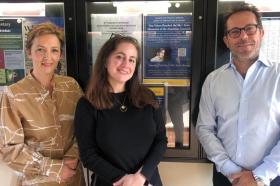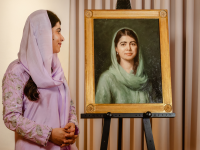
LMH Fellow in Music Professor Gascia Ouzounian (pictured above with Seminar organisers Dr Suzan Meryem Rosita Kalayci, and Dr Vazken Davidian) delivered a presentation at Pembroke College, Oxford, on 25 May entitled: ‘Our Voices Reached the Sky’: Sonic Memories of the Armenian Genocide.
This seminar is part of the Silence and Visuality Seminars on Armenian Art & History – an interdisciplinary series presenting current research by emerging and established scholars, and conversations with distinguished contemporary artists. The seminar series is being hosted by the Oxford Network for Armenian Genocide Research, with support from TORCH.
Professor Ouzounian is a sonic theorist whose work examines sound in relation to space, architecture, urbanism, and violence. At Oxford, she leads the European Research Council-funded project Sonorous Cities: Towards a Sonic Urbanism (soncities.org). Professor Ouzounian contributed a chapter to the open access eBook Soundwalking, also entitled ‘Our voices reached the sky’: sonic memories of the Armenian Genocide, which is freely available to download.
In her presentation, Professor Ouzounian explored her examination of sonic memories of the Armenian Genocide, which draws on survivors’ earwitness testimonies (testimonies describing auditory and sonic experiences of the Genocide). She argued that, while visual evidence usually predominates in studies of genocide, sonic memory - as a site of historical, cultural, and affective knowledge - can deepen our understanding of the historical aspects of genocide, as well as its social, psychological, and emotional dimensions.
In relation to contested histories, paying attention to sonic memories can also be a form of what Professor Ouzounian calls ‘counterlistening’: listening against official narratives and, in the case of the Armenian Genocide, against the narrative of genocide denial that continues to be maintained by the Turkish state. Professor Ouzounian suggests that the voices of Armenian Genocide victims - concealed and denied for over a century by Turkey - can nevertheless be excavated and listened to via the sonic memories of genocide survivors. She draws on oral testimonies collected by Verjiné Svazlian, an Armenian ethnographer who walked from village to village in Soviet Armenia for a period of decades, collecting, recording, and transcribing some 700 survivors’ testimonies when it was not safe to do so.
She explained the significance of Svazlian's original acts of counterlistening, explaining how it makes possible a more shared or public form of listening today. More broadly, she asked the audience to consider how sound and listening formed a part of the injuries as well as the violent tactics of the Armenian Genocide; and questioned how listening to genocide can reshape our understanding of genocide and its effects.


